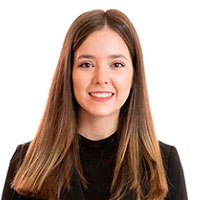
School of Law and International Relations
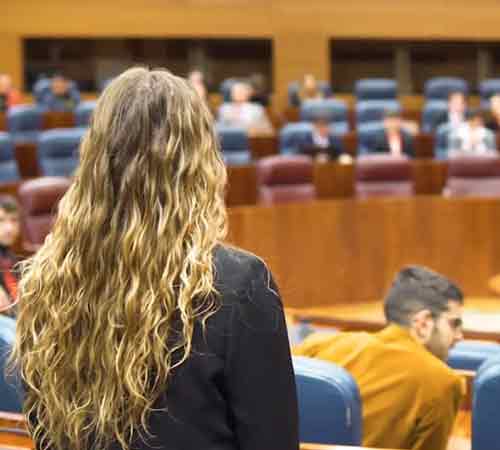
We work hard to obtain our students' maximum employability
The School of Law and International Relations is characterized by its professors' commitment to the students. We work to transform them into versatile professionals who help in society's development and prosperity.
We offer solid and innovative academic training. We promote the development of your competences and we accompany you so that -with your effort and tenacity- you can obtain the maximum employability and growth of your entrepreneurial spirit.
Wide range of degrees
We teach bachelor's degrees in the areas of international relations, law and security. Many of the subjects can be taken in Spanish or English.
Our School proposes different alternatives and study modalities, and offers the opportunity to combine studies through double degree programs, for students who aspire to a higher level of knowledge in their bachelor's degree period.
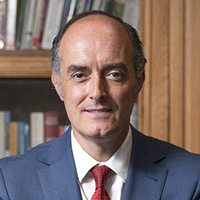 Alfonso López de la Osa Escribano
Dean of the School of Law and International Relations
Alfonso López de la Osa Escribano
Dean of the School of Law and International Relations
Organization

Alfonso López de la Osa Escribano
Decano Dean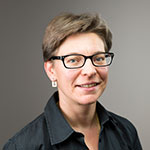
Gracia Abad Quintanal
gabad@nebrija.es Vicedecana de Investigación Vice Dean of ResearchDepartamento de Derecho Law Department
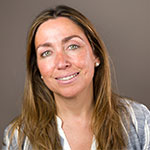
Ana Quintana Jiménez
aquintan@nebrija.es Directora del Departamento de Derecho Director of the Law Department Directora del Director of the Bachelor's Degree in Law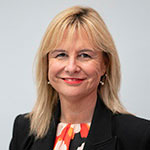
Mónica Assama
massama@nebrija.es Directora del Director of the Bachelor's Degree in Law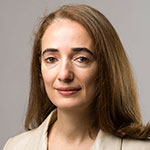
Mónica Pucci Rey
mpucci@nebrija.es Directora de la Clínica Jurídica Director of the Legal Clinic Codirectora del Co-director of the Master's Degree in Legal Practice and Representation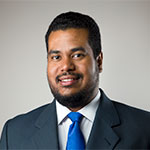
Luis A. García Segura
lgarcise@nebrija.es Director del Director of the Master's Degree in Data Protection and Security Coordinador del Coordinator ot the Master's Degree in Cybercrime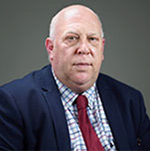
José Luis Cruz Beltrán
jcruzb@nebrija.es Director del Director of the Master's Degree in Occupational Risk Prevention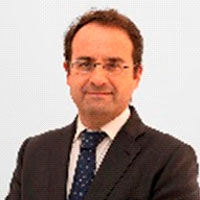
Daniel Ortiz Espejo
dortize@nebrija.es Coordinador Club de Mentores Mentor Club Coordinator Director Club de Debate Director of the Debate Club
Adela María Alija Garabito
aalija@nebrija.es Directora del Departamento de Relaciones Internacionales Director of the Department of International Relations Directora del Director of the Bachelor's Degree in International Relations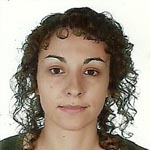
Laura González Piote
lgonzalezpi@nebrija.es Directora del Director of the Master's Degree in International Relations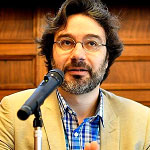
Carlos López Gómez
clopezgo@nebrija.es Director del Director of the Master's Degree in International Relations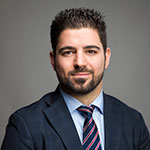
Nicolás Marchal González
amarchal@nebrija.es Director del Departamento de Seguridad y Defensa Director of the Security and Defense Department Director del Director of the Bachelor's Degree in Criminology and Forensic Sciences
Carlos Galán Cordero
cgalan@nebrija.es Director del Director of the Master's Degree in Intelligence Analysis and Cyberintelligence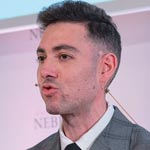
Álvaro Cremades Guisado
acremades@nebrija.es Coordinador del Coordinator of the Master's Degree in Security and Defense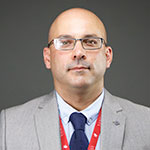
Giuseppe Kodjack VII Gangi Guillén
ggangi@nebrija.es Coordinador del Coordinator of the Master's Degree in International Humanitarian Law, Human Rights and Operational Law
Mónica Assama
massama@nebrija.es Coordinadora de Calidad y de Reconocimientos Quality and Recognition Coordinator
Giuseppe Kodjack VII Gangi Guillén
ggangi@nebrija.es Coordinador de Desarrollo Universitario University Development Coordinator
Nicolás Marchal González
amarchal@nebrija.es Coordinador de RRSS y Web Social networks and Web Coordinator
Luis A. García Segura
lgarcise@nebrija.es Coordinador de Movilidad Internacional International Mobility Coordinator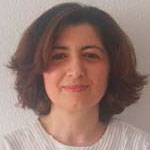
Sonia Boulos
sboulos@nebrija.es Responsable IP Grupo de Investigación Nebrija de Seguridad, Gestión de Riesgos y Conflictos (SEGERICO) Head of IP Nebrija Security Research Group, Risk and Conflict Management (SEGERICO) Directora Centro de Investigación en Seguridad, Estado de Derecho y Altas Tecnologías (CINSEDAT) Director of the Nebrija Research Center on Security, Rule of Law and High Technologies (CINSEDAT)
Diego Acosta Alcarazo
dacostaa@nebrija.es Director de la Cátedra Santander-Universidad Nebrija sobre “Migraciones y Derechos Humanos” Director of the Global Chair in Migration and Human Rights
Alfonso López de la Osa Escribano
alopezosa@nebrija.es Director de Cátedra Jean Monnet en Seguridad y Defensa (EUDEFENCE) Director of the Jean Monnet ChairLaw Activities
I. Academic extension activities
 Debate tournament
Debate tournament
The objective is for students to develop skills in a solid way, logical argumentation and correct oratory, as well as teamwork and search for information, legislation and jurisprudence.
The activity was carried out in two phases and most of the pairs had to participate in approximately 6 debates.
 Nebrija Moot Court
Nebrija Moot Court
It is an activity organized by the Department of Law, which intends, through trial simulation, for students to learn about the reality of the Courts, and the professional practice of lawyers. The 1st-year Law students took part in the simulation against the 2nd-year students. The acquired skills are the following:
Development of legal oratory and rhetoric. Ability to write legal texts. Ability for legal argumentation. Ability to analyze, interpret and understand legal texts. Ability to identify and resolve legal problems. Ability to correctly manage the legal databases of legislation, jurisprudence and doctrine. Acquisition of a critical conscience in the analysis of the legal system and development of legal reasoning. Ability to use constitutional principles and values as a working tool in the interpretation of the legal system. Become aware of the importance of Law as a regulatory system of social relations.
 Trip to Brussels
Trip to Brussels
In this activity, Nebrija students have the opportunity to learn first-hand about the different institutions of the European Union located in Brussels, having been invited by the European Parliament. In order to select the students, a seminar is held annually by Department professors and after a simulation and a test, the students who will take the trip are selected.
In Brussels, they will visit the Charlemagne Building of the European Commission, the Council of Ministers, the European Parliament and the Office of the Community of Madrid. In all the venues, conferences are attended that bring them closer to the reality of the Union and its Law.
Through this extracurricular educational activity, the following skills are acquired: fostering their personal ability to search for sources of information, legislation, the ability for oratory, argumentation, overcoming challenges, negotiation skills, development of specialized technical language, improvement of a second foreign language, and acquisition of social skills in terms of proper manners and behavior in different situations.
 Seminar: Legal Sources
Seminar: Legal Sources
Seminar for 1st and 2nd-year Law students to learn how to use the main databases and sources of legal information. They develop the skills to apply ICT to the field of Legal Sciences, become familiar with the use of legislative and jurisprudential databases, as well as specific software, to organize and manage their own time, to analyze and synthesize information that allows them to formulate judgments.
II. Visits to companies, institutions or places of cultural interest
 Visit to the Patent and Trademark Office
Visit to the Patent and Trademark Office
Commercial Law students visited the SPTO (Spanish Patent and Trademark Office), getting to know the institution from the inside, and visited the different sections where various research projects were explained to them, and allowed them to learn firsthand how and why a trademark is accepted or rejected.
 Visit to ICEX
Visit to ICEX
Law and Business Administration students visited ICEX. The visit involved giving them the opportunity to learn about the following areas: the experiences of Spanish companies abroad, obtaining financing, ICEX support inside and outside our borders, the results obtained by Spanish companies, how to interrelate internet with the business, and ultimately how to create and expand the company inside and outside our borders.
 Visit to the National Commission of Markets and Competition
Visit to the National Commission of Markets and Competition
Law students visited the CNMC, one of the most important bodies in the legal framework, whose study falls within Commercial Law. This is the body that guarantees free competition and regulates all markets and productive sectors of the Spanish economy to protect consumers.
At Nebrija and the Commercial Law area, we believe it is key that the students could learn how the institution works from the inside and see first-hand cases that had been submitted to the institution itself, and that they could experience a practical case in which they were the protagonists at the end of the visit.
 Visit to the Criminal Courts
Visit to the Criminal Courts
The 2nd-year students of the Bachelor's Degree in Law, who are taking the subject of Crimes and Misdemeanors in the Spanish Legal System, and the 4th-year students of the Bachelor's Degree in Law, who are taking the subject of Criminal Procedure Law, visited the Criminal Courts.
During the visit to the Provincial Court of Madrid, they witnessed an abbreviated criminal trial, which helped them to realize that criminal law and criminal procedural law are interrelated.
 Visit to the Social Courts
Visit to the Social Courts
The students visited the headquarters of the Social Courts of Madrid and attended various hearings. The visit began with a presentation on how social jurisdiction is organized.
Among the hearings attended were those of objective dismissal, claim of amount, and substantial modification of working conditions.
 Visit to SMAC
Visit to SMAC
The students visited the Arbitration and Conciliation Mediation Service of the Community of Madrid, and were able to learn first-hand how mediation works prior to the common jurisdictional route in the social sphere. The students were able to see the different situations that occur in this process.
 Visit to a prison
Visit to a prison
The students of the subject of Developing a Spirit of Participation and Solidarity: Human Rights, as well as 1st-year students of the Bachelor's Degree in Law, visited the Madrid II (Alcalá – Meco) Penitentiary Center. They were accompanied by Mr. Ángel Plaza, Deputy Director of the center, and professors Luis García and Jordi Regi.
The students were able to see for themselves the conditions in which inmates are treated in the Spanish prison system, visiting the cells and interacting with some inmates.
 Visit to the Garrigues Study Center and colloquium
Visit to the Garrigues Study Center and colloquium
The students learned about the professional experience of the office lawyer, issues regarding professional ethics, client relations and, in general, about the panorama of professional opportunities in the practice of law.
International Relations Activities

Institutional visitsVisits to different institutions, both national and international, allow students to further expand their knowledge of some of the decision-making mechanisms and forums, both internally as well as in matters of foreign policy and at the international level. This activity gave our students the opportunity to learn first-hand about the Congress of Deputies, the Ibero-American General Secretariat, the Office of the European Commission, Embassies of other countries in Spain, and the World Tourism Organization, among other institutions.

Nebrija MUNThe Nebrija University International Relations area promoted the creation of a Nebrija MUN Association that allows our students to participate in the different MUNs (Model United Nations) organized each year by the most prestigious university centers in the world. This activity gives our students the opportunity not only to become familiar with the practice of international discussion and negotiation, but also to improve their oratory and further expand their knowledge of both different international issues and the foreign policy of the different states.

Specialized conferences Each academic year, specialized conferences take place, which include: Seminars, Conferences with experts and round tables, so that the students of the Bachelor's Degree in International Relations have the opportunity to further learn about the most relevant issues of the structure and dynamics of today's international society.

Professional meetings International Relations students come into contact with professionals from the different fields for which the Bachelor's Degree prepares them: Diplomatic Corps, International Consulting, Cooperation and Development, Defense Missions, International Organizations, both governmental and non-governmental. In a relaxed atmosphere, the guests (ambassadors, senior officials, international observers, OIG staff, Think Tanks, etc.) explain how their activity is carried out in the international context and the functions they perform, bringing different professional profiles closer to the students of the Bachelor's Degree.

Study trip to Brussels
In this activity, Nebrija students have the opportunity to learn first-hand about the different institutions of the European Union located in Brussels, having been invited by the European Parliament. In order to select the students, a seminar is held annually by Department professors and after a simulation and a test, the students who will take the trip are selected.
In Brussels, they will visit the Charlemagne Building of the European Commission, the Council of Ministers, the European Parliament and the Office of the Community of Madrid. In all the venues, conferences are attended that bring them closer to the reality of the Union and its Law.
Through this extracurricular educational activity, the following skills are acquired: fostering their personal ability to search for sources of information, legislation, the ability for oratory, argumentation, overcoming challenges, negotiation skills, development of specialized technical language, improvement of a second foreign language, and acquisition of social skills in terms of proper manners and behavior in different situations.

Nebrija’s UNICEF Campus Nebrija University students launched the Nebrija UNICEF Campus. This initiative is carried out within the UNICEF Campus (Campus 89) that are part of a UNICEF Spain project promoted and managed by university students. It is an initiative of the UNICEF Spanish Committee aimed at university students. This initiative is included in Campus 89, a movement of students who are committed and active in promoting the survival, development and rights of children; they collaborate with the work that UNICEF does in more than 150 countries and territories.
Security Activities
 University Conference: Economic Crime and Corruption
University Conference: Economic Crime and Corruption
University Conference: Economic Crime and Corruption
>> See Poster
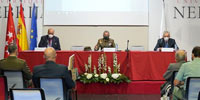 CICA-Nebrija Conference on Defense Culture for Young People 2021
CICA-Nebrija Conference on Defense Culture for Young People 2021
CICA-Nebrija Conference on Defense Culture for Young People 2021
>> See Article
 LIX CICA: Security and Defense: Ethical and Legal Challenges in Front of Current Conflicts
LIX CICA: Security and Defense: Ethical and Legal Challenges in Front of Current Conflicts
LIX CICA: Security and Defense: Ethical and Legal Challenges in Front of Current Conflicts
>> See Article
 I International Forum on Privacy and Data Protection
I International Forum on Privacy and Data Protection
I International Forum on Privacy and Data Protection
>> See Article
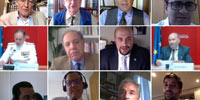 LV CICA: Global Commons & Security trends: towards a peaceful 21st century
LV CICA: Global Commons & Security trends: towards a peaceful 21st century
LV CICA: Global Commons & Security trends: towards a peaceful 21st century
>> See Article
Degrees
BACHELOR'S DEGREES
+ DIPLOMA IN ENGLISH PROFESSIONAL COMMUNICATION (Compulsory)
Double Bachelor's Degrees
MASTER'S DEGREES
MORE PROGRAMAS
Professors
The teaching staff of the School of Law and International Relations is made up of full-time professors and part-time associate professors.
The profile of full-time professors corresponds essentially to PhDs (most of them accredited), with dedication to research and undergraduate and postgraduate university teaching in their area of specialization.
Associate professors, closely linked to the exercise of their professional activity, offer students the most intense contact with professional reality that they will find once they complete their studies.
Finally, specialist professors in the field of communication and management skills who teach seminars and courses on professional skills. The University makes a firm commitment to offer its students all the professional and personal development tools that will be required of future professionals.
Research
We are committed to research and the generation of knowledge and science
In the field of research, our School has Research Chairs, spaces for the generation and availability of knowledge and science, supported by companies that trust in the ability of our School to generate prosperity in society:
The School dedicates part of its effort to research tasks, as a fundamental complement to teaching. These tasks are structured around the existing Research Groups, which are part of the official register of the University, and which materialize in research projects with companies and public institutions in the sector.
Along with these research chairs, and constantly working to generating knowledge and science, the School has Research Groups:
Nebrija Research Group on Security, Risk and Conflict Management (SEGERICO). Consult the lines of activity and research groups herePublications
School professors regularly publish work related to their research as an essential part of their activity at the University.
Consult the most recent publications here Consult the publications of the Chair of Conflict Resolution here"1st" Spanish University in Teaching uRanking
Among the 6 best Private Universities CyD Foundation
3rd Spanish private University in transparency CyT Foundation
Ranking Forbes - Top 5 Spanish Universities Ranking Forbes University
High score teaching and internacionalization QS Stars Ranking
High score online learning QS Stars Ranking
High score employability & inclusiveness QS Stars Ranking
"1st" Spanish University in Teaching uRanking
Among the 6 best Private Universities CyD Foundation
3rd Spanish private University in transparency CyT Foundation
Ranking Forbes - Top 5 Spanish Universities Ranking Forbes University
High score teaching and internacionalization QS Stars Ranking
High score online learning QS Stars Ranking

